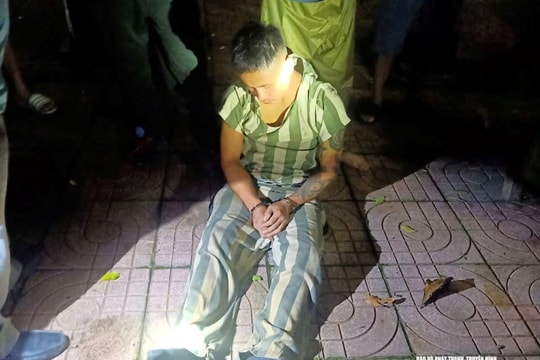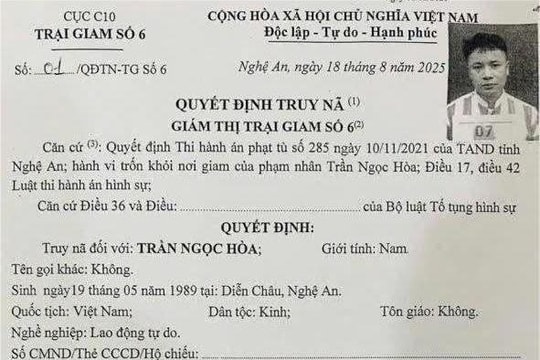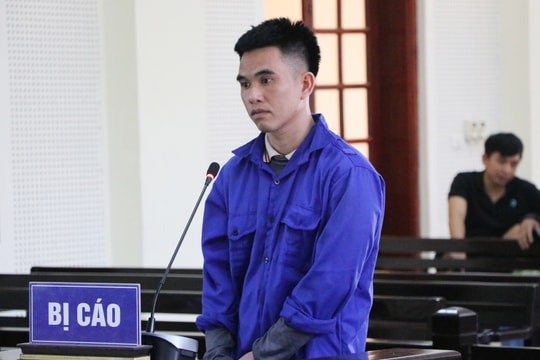Prison guard profession: Sacrifice to sow seeds of goodness
(Baonghean) - Sowing seeds of goodness, healing emotional wounds and soothing the inferiority complex and self-consciousness about illness for those who have made mistakes - that is the somewhat silent but extremely difficult and complicated work of the officers and soldiers of the police at Prison No. 6 (General Department VIII, Ministry of Public Security).
Facing the risk
Prison No. 6 located in Hanh Lam commune, Thanh Chuong district is currently managing and detaining about 4,000 prisoners, of which 326 prisoners have been found to be infected with the disease of the century HIV, 200 prisoners have progressed to AIDS (as of November 12, 2015). Implementing the project "Global Fund for HIV/AIDS Prevention and Control", each year, the Prison coordinates with the Nghe An HIV/AIDS Prevention Center to organize 2 testing sessions for about 600 prisoners at high risk of infection and always discovers 50 - 70 newly infected prisoners through each test.
The number of infected prisoners is also proportional to the difficulties and dangers that the prison police force is facing. Due to the nature of the job, which requires regular contact, management and education of law violators, many of whom are infected with HIV, although thoroughly equipped with knowledge related to prevention, there are still many unexpected situations that occur during the course of duty.
Since 2005, at Prison No. 6, 17 soldiers have been exposed to HIV, especially 4 medical staff who were exposed while treating prisoners' wounds. Fortunately, all soldiers were treated for exposure promptly and according to the correct procedures, so no one tested positive for HIV.
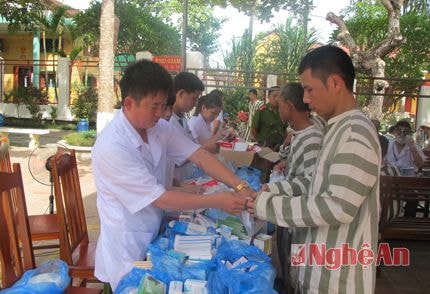 |
| Medical staff of Prison No. 6 periodically dispense medicine to prisoners. (Photo provided by Prison No. 6). |
Captain Nguyen An Loc (Head of the Medical and Environmental Protection Team, Prison No. 6) recalls an unforgettable memory in his career... One time he received an urgent report that a prisoner had a sudden heart attack. When he arrived at the infirmary, it was determined that the prisoner had a heart attack, he quickly applied CPR, saving the prisoner's life. However, while he was giving first aid, blood from the prisoner's body splashed onto his face and the prisoner was infected with HIV. However, he calmly handled the incident and thanks to his extensive experience in the profession, he was not infected with that terrible disease.
He shared: “The prisoner is on the fragile line between life and death, in front of him is not a prisoner but a critically ill patient. A doctor's conscience does not allow him to wait for the time to review the medical records. Occupational accidents are inevitable. In that situation, not only me but all my colleagues would do the same. Because that is the responsibility of the profession, of conscience.”
Love and responsibility
For anyone, when they know they have the disease of the century, it is easy to fall into a state of depression and mental breakdown. For patients serving sentences in prison, the psychological situation is even more severe and desperate. At that time, the responsibility of the police officers is not only to transform them back to the path of justice, but also to help them revive their spirit and determination to fight the disease.
During his decades of working as a prison guard, Captain Nguyen An Loc has witnessed many difficult situations of prisoners infected with HIV. There are those who are sick, abandoned by their families and friends, and are serving long sentences, they are extremely desperate and lead to uncontrolled behavior. At those times, he and his colleagues have to constantly encourage, share, and help those who have gone astray to overcome pessimism and discouragement.
“Nothing is completely lost, as long as there is life there is hope, only optimism and faith in tomorrow can make everything better” - those are the words of encouragement that Captain Nguyen An Loc often repeats to the HIV-infected prisoners he is directly treating.
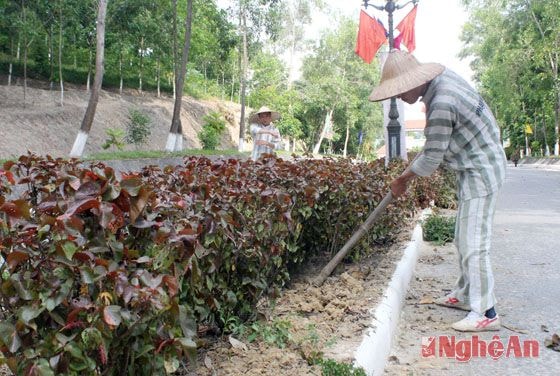 |
| Prisoners doing labor reform at Prison No. 6. Photo: Pham Bang |
In response to that concern, wholehearted sharing and responsibility, many prisoners have regained faith in life, actively reformed, completed their sentences and returned to integrate into the community and society.
Lieutenant Vuong Dinh Dien (born in 1985, Police Platoon, Sub-camp No. 1, Prison No. 6) is a prison officer directly responsible for educating 30 prisoners, including 2 HIV-infected prisoners. He is considered one of the prison officers who performs his duties well despite his young age and career. In particular, he has his own way of educating HIV-infected prisoners.
With the task of monitoring and managing prisoners 5 days a week, more than anyone else, prison officers like Dien are the ones who are closest to and understand the prisoners the best. Dien often talks and interacts with prisoners infected with HIV, listening to them share to understand the thoughts and feelings of people who are both entangled in the law and have a serious illness. From there, he has an appropriate educational method for each subject. Many times, Dien also takes a part of his meager salary to buy more gifts, cakes, and food to support and encourage prisoners in difficult circumstances.
Inside the prison, where there are people who have made mistakes and are making up for the wounds they caused to society, stories of humanity shine brightly. Accompanying the prisoners and patients on their journey to reform their conscience and in the fight against disease are police doctors, prison officers, soldiers from the criminal police force, mobile police, security guards, etc. Facing potential dangers, including the risk of infection with the disease of the century, the silent sacrifice of those who protect the peace of life deserves to be recognized by the community.
The Prime Minister has just issued a Decision regulating the allowance regime for People's Public Security officers and soldiers directly involved in management, education, medical examination and treatment of HIV/AIDS infected subjects in prisons, temporary detention camps, compulsory education facilities, reform schools and temporary detention houses. According to the above decision, medical staff, scouts, camp guards, base guards, searchers, educators, education officers, wardens, security and mobile police at prisons, temporary detention camps, compulsory education facilities, reform schools and temporary detention houses; cultural teachers, homeroom teachers in reform schools under the People's Public Security force are paid 500,000 VND/person/month. Head of the camp, Deputy Head of the camp, Head of the section, Deputy Head of the section, Head of the branch, Deputy Head of the branch; Team leaders, Deputy Team leaders and equivalent positions; officers and soldiers in charge of the remaining work at prisons, temporary detention camps, compulsory education facilities, reform schools and temporary detention houses are paid 400,000 VND/person/month. This Decision takes effect from November 1, 2015. |
Phuong Thao
| RELATED NEWS |
|---|

